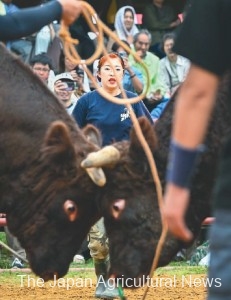IWATE, Oct. 6 — Rin Horie, 24, of the city of Kuji, Iwate Prefecture, is a “three-way” player, working at a cattle farm and a butcher shop and also as a seko bull handler for local traditional bullfighting matches.
The former village of Yamagata in Iwate Prefecture, now part of Kuji, has been known as a major producing region of Japanese Shorthorn cattle.
“Congratulations, Rin!” people called out in early September, as Horie, dressed in a white shiromuku bridal kimono, appeared at the Hiraniwa Kogen Bullring in the city filled with some 1,000 spectators and a fighting bull weighing a ton.
Horie herself came up with the idea of holding a wedding ceremony at the bullring.
Members of the Hiraniwa Kogen Bullfighting Association helped organize the ceremony, celebrating Horie and her husband Kanta, 26, with a traditional mochi rice cake-throwing event and photo sessions.
After graduating from high school, Horie, a native of the city of Ina in Nagasaki Prefecture, took interest in Japanese Shorthorn cattle raised in Iwate Prefecture and went on to study livestock farming at Iwate Prefectural Agricultural College.
In 2022, she took part in the government’s “local vitalization cooperator” program and moved to Kuji.
She worked at a cattle farm, monitoring cattle put out to pasture and helping with other tasks. She learned how hard it is to raise livestock and became devoted to the work.
Eager to become a professional in the beef-related business, Horie also started studying meat processing at Kitafudo, a butcher shop in the city specializing in Japanese Shorthorn beef.
After three years of training, she launched last year Tankakukousya Onozawa, an online shopping site for Japanese Shorthorn beef. In addition to promoting online, she sells the meat at events in various places in an effort to let more people know about the good taste of Japanese Shorthorn beef.
In June, she shipped cattle she had raised for 27 months for the first time.
While there were some areas for improvement in how the animal turned out, she had very strong feelings for the cattle, she said.
After shipping the cattle, she bought it all back and processed and sold it herself.
Toshiyuki Kakiki, 52, a cattle farmer and head of the bull handlers at the bullfighting association, said, “Horie is a hard worker. I hope she will continue to breathe new life into the Japanese Shorthorn cattle industry by making the most of her youth and promotional ability.”
Following the wedding ceremony, Horie changed to a seco outfit and handled bulls at the bullring.
The bulls moved dynamically, as Horie called out to them, “Yoshita!” meaning “well done” in a local dialect.
“I hope to become a cattle-fattening farmer in the future and raise cattle that would turn into delicious beef or fighting bulls,” Horie said.


